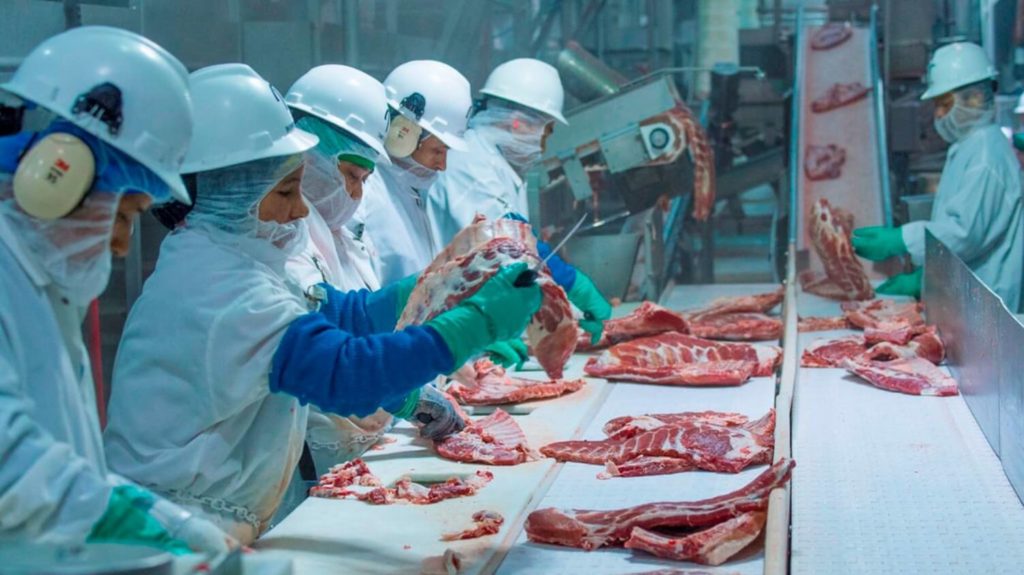(Updated April 27, 2020) | Smithfield Foods Inc. is closing its Sioux Falls-based pork plant indefinitely as hundreds of slaughterhouse workers test positive for coronavirus (COVID-19).
The pork plant has become the single-biggest source of coronavirus cases in the U.S., prompting the Centers for Disease Control and Prevention to send a team to the Smithfield plant to assist with mitigation efforts.
Health officials say 598 out of the state’s 1,311 confirmed cases of coronavirus are Smithfield plant workers. There have been 135 non-employee coronavirus cases connected to the plant, as well. South Dakota Governor Kristi Noem and Mayor Paul TenHaken called on the meat-processing company to remain closed, citing worker safety.
“As a critical infrastructure employer for the nation’s food supply chain and a major employer in Sioux Falls, it is crucial that Smithfield has a healthy workforce to ensure the continuity of operations to feed the nation,” said Ms. Noem and Mr. TenHaken in a joint letter. “At the same time, employees need a healthy work environment.”
The Sioux Falls plant, which employs approximately 3,700 people, is one of the largest pork processing facilities in the country. The Chinese company WH Group—which is owned by billionaire chairman and CEO Wan Long—bought the facility in 2013 for $4.7 billion.
The plant was initially shut down for three days for cleaning, but will now remain closed until advised otherwise. Smithfield Chief Executive Ken Sullivan warned that the closure could severely impact national meat production.
“We have a stark choice as a nation: we are either going to produce food or not, even in the face of COVID-19,” said Mr. Sullivan in a written statement. “It is impossible to keep our grocery stores stocked if our plants are not running.”

US Meat Inspectors Call Job A ‘Death Sentence’
U.S. meat inspectors say they are scared to do their jobs amid the pandemic, saying the USDA Food Safety and Inspection Service failed to protect them. Inspectors say they are not being provided adequate safety equipment like hand sanitizer and face masks.
One U.S. meat inspector told the Philadelphia Inquirer he asks himself the same question each morning: “Is this the day that I’m possibly given a death sentence for staying on the job?”
The agency is now holding weekly calls with inspectors so that they can voice their concerns.

Other Meatpacking Closures
Smithfield’s pork processing plant—and several other meatpacking facilities across the U.S.—have experienced high rates of coronavirus. Unions and advocacy groups highlight the close-quarters work environment and lack of appropriate personal protective equipment (PPE).
Meat companies including producers Tyson Foods, Cargill, National Beef Packing Co, and Empire Kosher Poultry Inc. have also slowed production or closed facilities in response to the spread of coronavirus and worker sickness.
JBS—the largest meat processing company in the world—temporarily closed a Pennsylvania-based beef plant earlier this month. The company also shut a meatpacking plant in Greeley, Colorado after several slaughterhouse workers tested positive for the coronavirus.
“We fully understand the seriousness of a plant closure and its economic impact,” said union president Kim C. Cordova. “However, safety must take precedence over profits.”
Prior to the outbreak, slaughterhouses were already extremely hazardous places to work. According to the Food Empowerment Project, company profits are consistently prioritized over slaughterhouse worker’s safety. In general, excessive production demands are the primary cause of worker injuries and animal welfare violations.
The JBS workers union says more than 50 employees are now thought to have coronavirus, while company officials report that two members have died. In some cases, employees protest their working conditions by staging walk-outs.
“You cannot make sacrifices like this with people’s lives,” Cordova told Bloomberg. “People can live without beef.”


